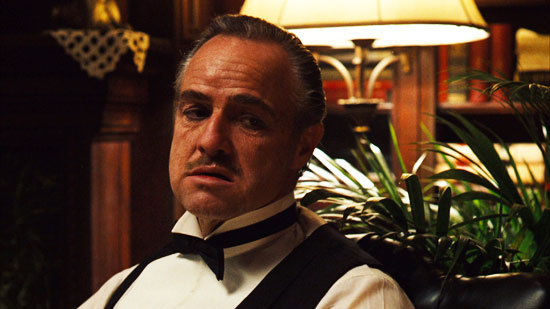Directed by Stevan Riley.
Starring Marlon Brando.
Steven Riley’s haunting documentary about the infamous Marlon Brando paints an intimate portrait but one that feels like well-worn ground. Martin Carr explains why he was disappointed…

Steven Riley would have us believe Marlon Brando was a genius. He would have us believe Brando represented and represents a touch stone for the acting elite. A man so eaten up by doubt that he sought solace behind smoke and mirrors. Riley would have us think that Brando’s acting ability stems from an unflinching honesty and commitment. For such a privately public figure, Marlon’s audio tapes, upon which this documentary hinge set out to offer us some insight.
Essentially Listen To Me Marlon is a retrospective film with audio mumblings. Much like the outtakes from Apocalypse Now, we are treated to the waffling of a once great film icon talking to himself. Having digitised his head before death, Brando’s replica lip-synchs these tapes against a black background. While rare behind the scenes footage interlinks each segue.

Raised by highly abusive alcoholic parents, this matinee idol clearly felt safest in someone else’s skin. Finding a mother figure in acting impresario Stella Adler, Marlon became the symbol for a generation of aspiring actors. Through a combination of an early Oscar victory, flawless features and pitch perfect performances he became a culture icon. Something which he neither understood nor fully came to terms with. From the documentary it becomes clear that this notoriety afforded him more respect than he believed himself due. What it also promoted however was complacency.
Forever a slave to process, Brando became contemptuous of those who failed to take him seriously. However this behaviour was indulged at first which would prove his undoing. What Riley points out through the film is that Brando was aware of this. Through the tapes it becomes clear his reclusive behaviour had much to do with fame. He failed to understand, even later on, how people could have such an obsessive interest in him. However he was a contradiction, as his presence on any film set came at a price which he readily exploited.
Brando played on this mystique as Mack Daddy to a generation of classic actors. And it is here in Listen To Me Marlon that you realise how subjective opinions are. Was Brando considered a genius because of talent or timing? Marlon freely admits he was just in the right place at the right time, with the right face and attitude. That he came to personify a cultural turning point has nothing to do with talent surely. There can be no doubt that Don Corleone is a masterclass in minimal acting, while Kurtz is mere waffle with good lighting in comparison. That both performances came from one man defies belief. But perhaps Kurtz is more presence than anything else, shaped mainly by Martin Sheen’s voiceover and the exceptional production design. Maybe all Coppola required of Brando was his silhouette on screen.
What Steven Riley’s documentary ultimately achieves is up for debate. Do we really learn anymore about Brando than we knew before? Are we any closer to moving beyond the clichés which tend to define over achievement? Extreme childhood trauma, domestic violence and continual upheaval tend to be trends which exist in most actors. Hence the need to escape, create and metaphorically disappear. All Riley has managed to do here is maintain Brando’s mystery. In my opinion as a fan Listen To Me Marlon fulfils neither form nor function and ultimately remains disappointing.



